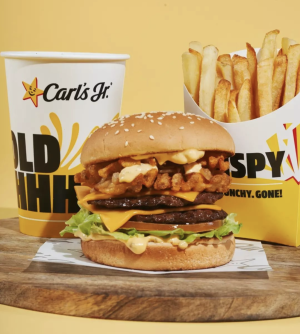Fan-favourite burger chain enters into administration
By
Seia Ibanez
- Replies 25
The dream of a classic burger joint Down Under has hit a snag as the burger chain Carl’s Jr has entered voluntary administration in Australia.
The chain, which once had plans to open a whopping 300 stores across the nation, has now left hundreds of employees facing uncertainty.
Carl’s Jr, which began in the United States and is known for its charbroiled burgers and indulgent menu, has become a casualty in the fast-food industry, with 24 stores affected by the administration.
KPMG, stepping in to manage the crisis, appointed David Hardy, George Georges, and Emily Seeckts as administrators to oversee the process.
The impact of this decision is far-reaching, with the majority of the Australian franchise located in regional areas of New South Wales, Queensland, and Victoria.
The CJ’s Group, which independently owns and operates 24 restaurants, is also the master licensee for an additional 25 locations run by third-party sub-licensees.
David Hardy from KPMG Australia’s restructuring services has stated that their initial efforts will be to ‘stabilise' the group’s operations.
‘We will be conducting an immediate sale process of the existing store network and operations,’ he said.
‘We will be working with all stakeholders, including employees, suppliers and landlords, to maximise the outcome for all parties.’
Stakeholders are expected to be contacted within days, and a creditors meeting has been scheduled for 7 August.
The future of the stores hangs in the balance, with only four expected to remain open under the CJ’s Group, while 20 will face immediate closure.
However, there is a silver lining for some, as the appointment of administrators does not include the 25 restaurants independently owned and operated by third-party sub-licensees.
These restaurants will transition to a direct licensed relationship with CKE Restaurants Holdings, Inc. (CKE) and are expected to experience minimal change.
The administration of Carl’s Jr's Australian stores is a standalone issue and will not affect the chain's locations overseas.
Carl’s Jr has a global presence in more than 30 countries, continuing to serve up its signature burgers elsewhere.
The chain's foray into the Australian market began in 2016, with the first store opening in Bateau Bay on the NSW Central Coast.
Positioned as a higher-end fast-food restaurant, Carl’s Jr's pricing was steeper compared to its competitors.
Unfortunately, the brand couldn't withstand the downturn in spending on take-out food, which has been exacerbated by the rising cost-of-living crisis.
 Have you been affected by the Carl’s Jr closures? Do you have fond memories of dining at their restaurants? Let us know in the comments below!
Have you been affected by the Carl’s Jr closures? Do you have fond memories of dining at their restaurants? Let us know in the comments below!
The chain, which once had plans to open a whopping 300 stores across the nation, has now left hundreds of employees facing uncertainty.
Carl’s Jr, which began in the United States and is known for its charbroiled burgers and indulgent menu, has become a casualty in the fast-food industry, with 24 stores affected by the administration.
KPMG, stepping in to manage the crisis, appointed David Hardy, George Georges, and Emily Seeckts as administrators to oversee the process.
The impact of this decision is far-reaching, with the majority of the Australian franchise located in regional areas of New South Wales, Queensland, and Victoria.
The CJ’s Group, which independently owns and operates 24 restaurants, is also the master licensee for an additional 25 locations run by third-party sub-licensees.
David Hardy from KPMG Australia’s restructuring services has stated that their initial efforts will be to ‘stabilise' the group’s operations.
‘We will be conducting an immediate sale process of the existing store network and operations,’ he said.
‘We will be working with all stakeholders, including employees, suppliers and landlords, to maximise the outcome for all parties.’
Stakeholders are expected to be contacted within days, and a creditors meeting has been scheduled for 7 August.
The future of the stores hangs in the balance, with only four expected to remain open under the CJ’s Group, while 20 will face immediate closure.
However, there is a silver lining for some, as the appointment of administrators does not include the 25 restaurants independently owned and operated by third-party sub-licensees.
These restaurants will transition to a direct licensed relationship with CKE Restaurants Holdings, Inc. (CKE) and are expected to experience minimal change.
The administration of Carl’s Jr's Australian stores is a standalone issue and will not affect the chain's locations overseas.
Carl’s Jr has a global presence in more than 30 countries, continuing to serve up its signature burgers elsewhere.
The chain's foray into the Australian market began in 2016, with the first store opening in Bateau Bay on the NSW Central Coast.
Positioned as a higher-end fast-food restaurant, Carl’s Jr's pricing was steeper compared to its competitors.
Unfortunately, the brand couldn't withstand the downturn in spending on take-out food, which has been exacerbated by the rising cost-of-living crisis.
Key Takeaways
- US burger chain Carl's Jr. has entered voluntary administration in Australia, affecting 24 owned stores and hundreds of employees.
- Operational stabilisation is the immediate focus of KPMG's appointed administrators, who are also conducting a sale process of the store network.
- Stakeholders, including employees, suppliers, and landlords, are to be involved in maximising outcomes with a creditors meeting scheduled for 7 August.
- While 20 stores will close immediately under the CJ's Group, the administration will not affect the independently operated stores under third-party sub-licensees, which will transition to a direct licensed relationship with CKE Restaurants Holdings, Inc.








